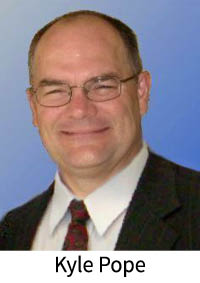

Kyle Pope preaches for the Olsen Park church of Christ in Amarillo, TX, where he also serves as an elder. He and his wife Toni have three children: Torhi, Caleb, and Nathan. kmpope@att.net.
“Let the words of my mouth and the meditation of my heart be acceptable in Your sight, O Lord, my strength and my Redeemer” (Psalm 19:14).
Why do the accounts of Matthew and Mark speak of Jesus blessing the bread but giving thanks for the fruit of the vine? Does this show a difference in what is to be done for each element?
In Matthew’s account of the institution of the Lord’s Supper, the Holy Spirit records that, “…as they were eating, Jesus took bread, blessed and broke it, and gave it to the disciples and said, ‘Take, eat; this is My body’” (26:26). Matthew goes on to record that Jesus then, “…took the cup, and gave thanks, and gave it to them, saying, ‘Drink from it, all of you’” (26:27). We note that Matthew describes Jesus “blessing” the cup but then “giving thanks” for the bread. This same distinction is found in Mark’s account (Mark 14:22-23). This leads to the question, is there a difference between “blessing” and “giving thanks” for the different elements?
The difference in translation in these texts reflects the use of two distinct words in the Greek. The word translated “bless” comes from the word eulogeō which Thayer defines “to praise, celebrate with praises; to invoke blessings; to consecrate a thing with solemn prayers, to ask God’s blessing on a thing…” (Greek-English Lexicon of the New Testament). The prefix eu- meaning “well, or good” is combined with a form of the word legō meaning “to speak.” Thus it is literally “to speak well” of something (cf. James 3:10 where the noun is used). The single word in the Greek, rendered “give thanks” is eucharisteō meaning “to be grateful, feel thankful; give thanks” (Thayer). The name “eucharist,” which the denominational world applies to the Lord’s Supper, is never used in Scripture as a name for the memorial, but comes from this verb. The idea here is using the mouth to express thankfulness – in the context, thankfulness for the memorial fruit of the vine.
While the accounts of Matthew and Mark might lead us to think that we must ask the Lord’s “blessing” for the bread, yet express “thanks” for the cup, the accounts in Luke and 1 Corinthians give us further insight into how these words are to be understood. Luke records, “Then He took the cup, and gave thanks (eucharisteō), and said, ‘Take this and divide it among yourselves’” (22:17). This took place before they ate the Passover meal. This is clear because Luke goes further to record that during the meal Jesus, “…took bread, gave thanks (eucharisteō) and broke it, and gave it to them, saying, “This is My body which is given for you; do this in remembrance of Me” (22:19). Luke then tells us, regarding the cup for which Jesus had previously given thanks and divided, “Likewise He also took the cup after supper, saying, ‘This cup is the new covenant in My blood, which is shed for you’” (22:20). Luke uses the term eucharisteō, “give thanks,” in reference to what Jesus did to the bread and the cup. Paul also, although he does not address the fact that Jesus gave thanks for the cup before the meal, echoes the same wording describing Jesus “giving thanks” for the bread and taking the cup after supper (1 Cor. 11:23-25).
What does this teach us about the different words used in Matthew and Mark? The account in Luke shows us that while a subtle difference in meaning exists between “blessing” (eulogeō) something and “giving thanks” (eucharisteō) for it, the two words are basically used synonymously. They are both appeals of gratitude to God as well as appeals that God will accept the memorial observance as something well-pleasing to Him.
Is “blessing” the elements the same as “giving thanks” for the elements? It might be argued that Christ alone, blessed the bread, but Christians cannot “bless” the elements. That is not correct. While it is true that we do not determine whether God accepts something as well-pleasing to Him, or not, Scripture does teach that the elements of the memorial are “blessed” by Christians. One chapter before Paul recounts the institution of the Lord’s Supper, he asks, “The cup of blessing which we bless (eulogeō), is it not the communion of the blood of Christ?” (1 Cor. 10:16a). This shows two things: (1) The same things which Matthew and Mark refer to as “giving thanks” Paul speaks of as “blessing” the cup; (2) This is something which “WE bless” as Christians.
What does this mean to us? We should make certain that the prayers we offer in the observance of the memorial focus on the elements and what they represent. The Lord’s Supper is not the time for prayers for the sick, for our troops, or other things for which we ought to pray. However, the very fact that Scripture uses two words (eulogeō, “to bless,” and eucharisteō, “to give thanks”) synonymously for what is commanded regarding prayer for the elements shows us that either or both can be used to describe what precedes eating of the memorial.